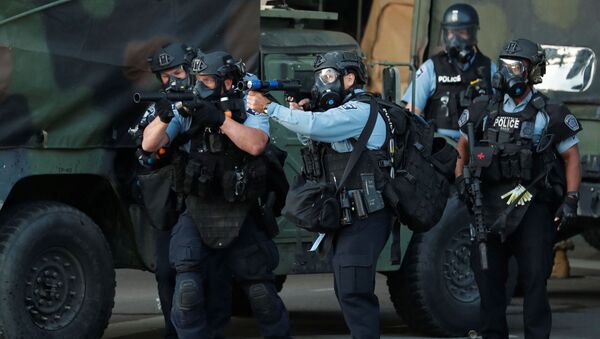Mass protests have erupted in the US following the latest police killing of an unarmed African American in Minneapolis, in the state of Minnesota. George Floyd, 46, died from apparent suffocation, as he lay on the ground handcuffed, whilst a police officer pressed his knee against Mr Floyd's neck. Mr Floyd, who police say was arrested on suspicion of forgery, can be heard to repeatedly say "I can't breath" in a video filmed by a bystander as onlookers can be heard calling for the officer to get off the victim's neck.
According to Mapping Police Violence law enforcement officers in the US killed 1,099 people in 2019. People of Black African descent are three times more likely to be killed by police compared to their Euro American counterparts although African Americans are 1.3 times more likely to be unarmed. In 99% of cases involving killings by police no charges are ever brought against an officer.
Alex S. Vitale is Professor of Sociology and Coordinator of the Policing and Social Justice Project at Brooklyn College and a Visiting Professor at London Southbank University. He explains to Sputnik that nothing short of a radical re-think of policing is needed to bring an end to police brutality and excessive use of force.
Sputnik: The Democratic Party is often associated with being anti-racist and sympathetic to the US's ethnic minority populations. Yet the governor in the state of Minnesota is a Democrat as was the governor of Maryland, the location of the last major protests after the police killing of Freddie Gray, in Baltimore.
To what extent does it make a difference who the president of the United States is and who the governor is in terms of the nature and quality of policing in the US?
Alex Vitale: Policing in the US is a very de-centralized enterprise. We have around 20,000 independent departments, the majority of which have under 25 officers. The real issue is that we have a broad based-bipartisan commitment to austerity politics. The pressures of global competition and federal disinvestment in cities, means that local leaders in both parties have systematically eviscerated basic services and then used police to manage the consequences.
The result is a massive expansion of policing that brings with it problems of racial disparities in enforcement and violence. The war on drugs, anti-gang policing, school police, and 'broken windows' oriented enforcement are all efforts to manage the consequences of economic displacement.
The difference in political parties is expressed only in terms of the willingness of many Democrats to waste millions of dollars on pointless procedural reforms like implicit bias training, civilian review boards, and community policing, while Republicans prefer to rhetorically support the "thin blue line."
Sputnik: Violence within US police forces, at least towards certain segments of the population, appears to be widespread. Why does this appear to be the case?
Alex Vitale: Because American policing is deeply rooted in the use of violence to manage social problems and to ensure a system of racialized economic exploitation. When we expand their scope of operation and militarise them, then we should expect there to be more violence.
Sputnik: A recent gallop poll found that 53% of Americans have either a "great deal" or "quite a lot" of confidence in the police. The highest that figure has been since 1993 was 64%. To what extent do you think these confidence levels are shaped by a persons' class and ethnicity and why would that matter?
Alex Vitale: These numbers are heavily skewed by race. Too often race trumps class and we can see this with support for the police. Some research shows that regardless of class, the closer White people live to Black people, the more likely they are to wholeheartedly support the police. This is complicated by the fact that even many non-White people support police because they have been told that it is the only tool available to solve solve every community problem of public safety and disorder.
Sputnik: To what extent is racism or sexism in police forces the issue or an issue? Is the solution perhaps to be hiring more black or female police officers? Would that solve the problem, if not, why not?
Alex Vitale: While there is certainly a lot of explicit racism in American policing, that is not the real issue.
The racism is baked into the decision by politicians to use police in non-White communities instead of investing in needed services. The police did not invent the 'War on Drugs'. That was a racist political program designed to appeal to White racism int he wake of the Civil Rights movement. Police reforms like anti-bias training won't change that.
Sputnik: You've been covering policing in the US for many years and recently authored The End of Policing. What can the origins of modern policing tell us about how and why the police operate as they do?
Alex Vitale: The origins of policing have always been tied to regimes of exploitation. In the late 18th and early 19th Century, when most police forces are created, this revolved around the dynamics of colonialism, slavery, and industrialisation. Policing emerges as a way to more efficiently and "legitimately" manage the consequences of those forms of exploitation.
Sputnik: What, in your opinion, needs to be done in order to address police brutality and excessive use of force across the country?
Alex Vitale: A radical defunding of the police and the diversion of those resources into community building projects like supportive housing, mental health and substance abuse services, community based anti-violence initiatives, more counsellors and restorative justice programs in schools, youth jobs, etc.
The issue in Minneapolis is that they have attempted every form of superficial police reform and it has made no difference. They need to be defunded not retrained.


